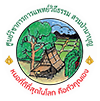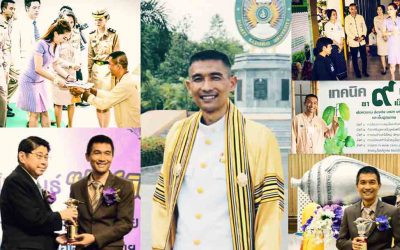วิเคราะห์ศาสตร์การแพทย์วิถีธรรมของ ดร.ใจเพชร กล้าจน
นางสาวลักขณา แซ่โซ้ว
วิทยานิพนธ์นี้เป็นส่วนหนึ่งของการศึกษา ตามหลักสูตรปริญญาพุทธศาสตรมหาบัณฑิต
สาขาวิชาพระพุทธศาสนา บัณฑิตวิทยาลัย
มหาวิทยาลัยมหาจุฬาลงกรณราชวิทยาลัย
พุทธศักราช ๒๕๖๕
(ลิขสิทธิ์เป็นของมหาวิทยาลัยมหาจุฬาลงกรณราชวิทยาลัย)
บทคัดย่อ
การวิจัยนี้มีวัตถุประสงค์ ๓ ประการ คือ
(๑) เพื่อศึกษาหลักการดูแลสุขภาพในพระพุทธศาสนา
(๒) เพื่อศึกษาศาสตร์การแพทย์วิถีธรรมของ ดร.ใจเพชร กล้าจน
(๓) เพื่อวิเคราะห์ศาสตร์การแพทย์วิถีธรรมของ ดร.ใจเพชร กล้าจน เป็นการวิจัยเชิงคุณภาพ
ผลการวิจัยพบว่า
หลักการดูแลสุขภาพในพระพุทธศาสนา เป็นการปฏิบัติเพื่อให้เกิดความสุข ความสบาย ความสมบูรณ์ ที่ครอบคลุมทั้งด้านร่างกาย จิตใจ สังคม และปัญญา โดยปฏิบัติอย่างสมดุลและเป็นองค์รวม ซึ่งคำตรัสของพระพุทธเจ้าทั้งหมดนั้น ทุกหลักธรรม/พระสูตร/พระพุทธพจน์ ล้วนเป็นสัจจะหรือความจริงแท้ซึ่งสอดคล้องเป็นอันหนึ่งอันเดียวกันทั้งหมด คือ เป็นไปเพื่อนิโรธ/วิมุตติ/นิพพาน ซึ่งสุขภาวะด้านปัญญา คือ การเข้าถึงโลกุตรปัญญา หรือปัญญาที่สามารถดับกิเลสตัณหาอุปาทานได้ (นิโรธ) เข้าถึงสภาวะของความพ้นทุกข์ (วิมุตติ) และความสุขอันยั่งยืนที่เป็นโลกุตรสุข (นิพพาน) ซึ่งสุขภาวะด้านปัญญา จะทำให้เกิดสุขภาวะด้านร่างกาย จิตใจ และสังคม ตามมาได้
ศาสตร์การแพทย์วิถีธรรมของ ดร.ใจเพชร กล้าจน เป็นศาสตร์การแพทย์แผนใหม่ของโลก มีจุดกำเนิดในประเทศไทย มีแนวคิดหลัก คือ การฝึกฝนปฏิบัติเพื่อเข้าถึงสภาวะของความสุขอันสูงสุด คือ นิโรธ วิมุตติ นิพพาน ไปเป็นลำดับ มีแนวคิดย่อย คือ
- (๑) ใจเป็นประธานของสิ่งทั้งปวง
- (๒) ตนเป็นที่พึ่งแห่งตน
- (๓) ดับทุกข์ที่เหตุ (เหตุคือตัณหา)
- (๔) ประหยัดเรียบง่าย
- (๕) มีประโยชน์ไม่มีโทษ
- (๖) พิสูจน์ผลได้ด้วยตนเอง
- (๗) เป็นจริงตลอดกาล และ
- (๘) เกื้อกูลผองชน
มีการอธิบายกลไกการเกิดการหายของโรคอย่างเป็นวิทยาศาสตร์ทั้งเชิงนามธรรมและรูปธรรม มีวิธีปฏิบัติที่เรียกว่าหลัก ๙ ข้อสู่สุขภาวะแห่งพุทธะ หรือยา ๙ เม็ดของแพทย์วิถีธรรม มีสโลแกนคือ “หมอที่ดีที่สุดในโลกคือตัวเราเอง” “ลดกิเลสรักษาโรค” “ศูนย์บาทรักษาทุกโรค” โดยในค่ายสุขภาพแพทย์วิถีธรรม จะมีการปฏิบัติเหตุแห่งวิมุตติ ๕ ประการ แทรกอยู่ในทุกกิจกรรมของค่าย
วิเคราะห์ศาสตร์การแพทย์วิถีธรรม ดังนี้
(๑) หลัก ๙ ข้อสู่สุขภาวะแห่งพุทธะ หรือยา ๙ เม็ดของแพทย์วิถีธรรม มีเนื้อหาสาระที่สอดคล้องกันกับหลักพุทธศาสตร์ คือ เป็นหลักปฏิบัติเพื่อให้เกิดความสุข ความสบาย ความสมบูรณ์ อย่างสมดุลเป็นองค์รวมครอบคลุมทั้ง ๔ ด้าน คือ ร่างกาย จิตใจ สังคม และปัญญา
(๒) ผลของการปฏิบัติ คือ รักษาโรคได้จริง (ผลขึ้นอยู่กับการปฏิบัติของผู้นั้น) และก่อให้เกิดความสุข ความสบาย ความสมบูรณ์ของชีวิตใน ๗ ด้าน คือ ด้านร่างกาย จิตใจ สังคม ปัญญาสู่ความพ้นทุกข์ เศรษฐกิจ คุณภาพชีวิตโดยรวม และ การพึ่งตนและช่วยเหลือผู้อื่นให้พ้นทุกข์ (ภาวะแห่งพุทธะ)
(๓) สิ่งค้นพบใหม่จากงานวิจัยนี้ คือ คำอธิบายกลไกการเกิดการหายของโรคอย่างเป็นวิทยาศาสตร์ ที่ครบถ้วนสมบูรณ์ทั้งวิทยาศาสตร์เชิงนามธรรมและรูปธรรม
An Analysis of Jaiphet Klajon’s Concept in Buddhist Dhamma Medical Science
Miss Lakkhana Saesow
A Thesis Submitted in Partial Fulfillment of the Requirements for the Degree of Master of Arts (Buddhist Studies)
Graduate School
Mahachulalongkornrajavidyalaya University C.E. 2022
(Copyright by Mahachulalongkornrajavidyalaya University)
ABSTRACT
This study has the following objectives:
- To investigate the concept of Health Care in Buddhism,
- To investigate the concept of Buddhist Dhamma Medical Science of Dr. Jaiphet Klajon, and
- To analyze the Buddhist Dhamma Medical Science of Dr. Jaiphet Klajon. The qualitative research approach was used for this investigation.
According to the findings, Buddhism Health Care is the practice of achieving a state of enjoyment, contentment, and fulfillment by addressing four components: physical, mental, social, and intellectual (spiritual) aspects in a balanced holistic manner. All of the Buddha’s statements are true, and they all go to the same place, Nirodha/ Vimutti/ Nibbana. Access to the universe of wisdom is defined as intellectual wellness. That can quench defilements/lust/preconception (Nirodha), achieve emancipation (Vimutti), and achieve lasting happiness in the ultimate happy realm (Nibbana). Physical, mental, and social health are all influenced by intellectual health.
Dr. Jaiphet Klajon’s Buddhist Dhamma Medical Science is a new science of medicine that emerged in Thailand. The central idea is “the practice of attaining the state of supreme enjoyment, which is Nirodha, Vimutti, and Nibbana, respectively.” There are several sub-concepts, such as (1) mind in control, (2) self-reliance, (3) desire is the source of pain, (4) living simply, (5) no damage, (6) verifiable, (7) forever true, and (8) sustaining the world. The comprehensive component of the relativity of abstract science and physical science describes the illness mechanism. The 9 Principles of Buddhahood, or 9 tablets of medicine, are a practice. Dr. Jaiphet Klajon’s slogans for Buddhist Dhamma Medical Science include “becoming one’s own doctor,” “the elimination of wishes is the healing of ailments,” and “zero-baht treatment facilities.” The Buddhist Dhamma Medical Training camp incorporates the five liberation practices into all camp activities in a harmonic manner.
The analysis of Buddhist Dhamma Medical Science are :
(1) the 9 Principles of Buddhahood or 9 tablets of medication have the same content with Buddhist principles, that are the practices to achieve a state of happiness, comfort, and completeness, which cover four aspects: physical, mental, social, and intellectual (spiritual) aspects in a wholistic balance,
(2) The result of practice is that every disease can be treated (the outcome is dependent on the sick person’s ability to practice), the quality of life is improved in every dimension, such as physical, mind, society, intellect, economy, overall quality of life, self-reliance, and assisting people to overcome suffering (Buddhahood property),
(3) A unique result from this study is a clear and comprehensive explanation of the illness process from a holistic perspective in the relativity of abstract and physical science.
วิธีใช้ Embed PDF
- กรุณากดลูกศร ซ้าย-ขวา ในการเปลี่ยนหน้า
- ถ้าหากตัวอักษรเล็ก-ใหญ่เกินไป กรุณากดเครื่องหมาย บวก-ลบ เพื่อปรับขยาย-ลดตัวอักษร


